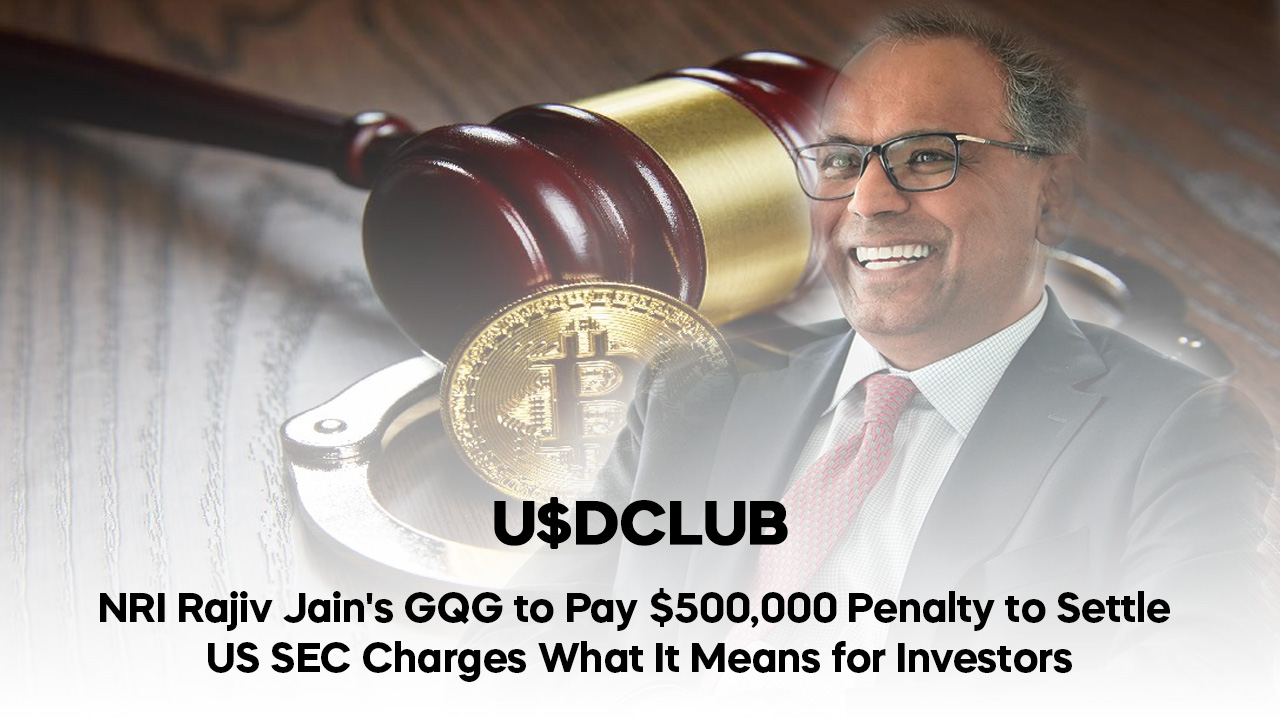In a major development within the global financial world, *Rajiv Jain‘s GQG Partners, a prominent investment firm led by Non-Resident Indian (NRI) billionaire Rajiv Jain, has agreed to pay a *$500,000 penalty** to settle charges brought by the *U.S. Securities and Exchange Commission (SEC)*. This penalty arises from violations concerning the failure to disclose conflicts of interest in its investment practices. The settlement, which comes without the firm admitting or denying the allegations, raises significant questions about the transparency of financial management practices, the firm’s reputation, and the potential implications for investors.
In this blog, we’ll take a closer look at the background of GQG Partners, the SEC’s charges, the settlement, and what this means for investors who have been keeping a close eye on Rajiv Jain’s globally successful asset management firm.
Who Is Rajiv Jain, and What Is GQG Partners?
Rajiv Jain, an NRI billionaire and the *founder of GQG Partners, is a well-known figure in global financial circles. GQG Partners, based in Florida, USA, is an investment management firm that specializes in **global equities*. The firm manages assets worth over $100 billion for institutions, sovereign wealth funds, and other investors. It is highly regarded for its performance, especially in emerging markets, and has rapidly become one of the key players in the investment industry.
Jain himself is known for his disciplined, contrarian investment approach, often making bold bets in sectors where others see risk. Under his leadership, GQG Partners has gained recognition for generating consistent returns while minimizing downside risk, making it an attractive choice for investors worldwide.
However, the recent penalty imposed by the SEC puts a spotlight on the firm’s practices, raising questions about how conflicts of interest are handled and disclosed in an industry where transparency is paramount.
Understanding the SEC Charges Against GQG Partners
The *U.S. Securities and Exchange Commission (SEC)* is the federal agency responsible for enforcing securities laws and regulating the securities industry in the United States. One of its primary goals is to ensure transparency and fairness in the financial markets, particularly when it comes to protecting investors from potential fraud or misconduct.
In this case, the SEC’s charges against GQG Partners revolve around the firm’s failure to properly disclose *conflicts of interest* related to its investment practices. According to the SEC, GQG Partners did not adequately inform its clients about the potential conflicts that arose from certain financial arrangements, specifically involving its dealings with third parties.
What Are Conflicts of Interest?
In the investment industry, a conflict of interest arises when a firm or individual has competing interests or loyalties that could influence their decision-making process. For example, if an investment firm receives compensation from a third party for recommending a particular product or service, it could potentially bias their judgment when advising clients.
In GQG’s case, the SEC alleges that the firm failed to disclose certain financial incentives that could have influenced its investment recommendations. This lack of transparency potentially misled investors, who were not fully informed about how these conflicts might impact the management of their assets.
The Penalty and Settlement
GQG Partners has agreed to pay *$500,000* to settle the SEC’s charges. Importantly, the settlement does not require the firm to admit or deny the allegations, which is a common outcome in such regulatory actions. By settling, GQG Partners can avoid a lengthy and potentially costly legal battle while still addressing the SEC’s concerns.
While the settlement puts an end to this specific case, it brings to light the importance of transparency in financial management and the regulatory scrutiny that even successful firms like GQG Partners must face. For investors, the settlement may raise concerns about the firm’s internal practices, but it also shows that GQG is willing to take corrective actions and settle the matter to move forward.
Impact on GQG’s Reputation
One of the immediate questions that arises from this settlement is the potential impact on *GQG Partners’ reputation*. As a firm managing over $100 billion in assets, GQG’s success largely hinges on the trust and confidence of its investors.
Transparency and Trust in the Investment Industry
Transparency is a cornerstone of trust in the financial world. Investors, particularly institutional clients, rely on investment managers to act in their best interest and to disclose any potential conflicts that could influence investment decisions. When conflicts of interest are not disclosed, it undermines trust and can lead to reputational damage.
In this case, GQG’s failure to disclose conflicts of interest may raise red flags for some investors, particularly those who prioritize *corporate governance* and ethical practices in their investment decisions. However, it’s important to note that the firm’s decision to settle the charges rather than fight them in court suggests a willingness to address the issue and move forward.
Long-Term Reputation Management
For GQG Partners, the key to maintaining its reputation in the wake of this settlement will be how it handles the aftermath. The firm may need to take additional steps to assure clients that it has implemented stronger internal controls and compliance measures to prevent similar issues from arising in the future.
GQG’s reputation has been built on its strong investment performance, particularly in emerging markets and contrarian bets. If the firm continues to deliver solid returns for its clients, it’s likely that the impact of this settlement on its reputation will be short-lived. Investors often prioritize performance, and as long as GQG can maintain its track record of success, it may weather this storm relatively unscathed.
What This Means for GQG Investors
For investors in GQG Partners, the settlement raises important considerations about *due diligence* and the importance of transparency in asset management. While the firm’s investment strategy and performance remain intact, the SEC’s charges highlight the need for investors to be vigilant about understanding how their investment managers handle potential conflicts of interest.
-
Reassessing Transparency and Governance
One immediate takeaway for investors is the need to reassess the *transparency* and *corporate governance* practices of their investment managers. Investors should ask questions about how conflicts of interest are disclosed and managed, and whether the firm has robust internal controls in place to ensure that client interests are always prioritized.
-
Short-Term vs. Long-Term Concerns
In the short term, the settlement may raise concerns among investors, particularly those who value transparency and ethical practices. However, for many investors, the primary focus will likely remain on GQG’s performance and its ability to continue delivering strong returns.
For long-term investors, the key question will be whether GQG has taken sufficient steps to address the underlying issues raised by the SEC. If the firm can demonstrate a commitment to stronger governance and compliance, it may be able to maintain the trust of its clients despite the settlement.
-
Potential Impact on Asset Flows
While the $500,000 penalty is a relatively small amount for a firm managing billions of dollars, the *reputational impact* could influence the firm’s ability to attract new clients or retain existing ones. Asset flows into the firm’s investment vehicles could slow down if institutional clients or other large investors become concerned about governance issues.
However, given GQG’s strong performance track record, many investors may choose to overlook the settlement, focusing instead on the firm’s ability to generate returns in a challenging global investment environment.
The Bigger Picture: Regulatory Scrutiny in the Investment Industry
The settlement between GQG Partners and the SEC also serves as a broader reminder of the *regulatory scrutiny* that investment firms face, particularly in the United States. The SEC’s role in enforcing securities laws and ensuring transparency in the financial markets is critical to protecting investors and maintaining market integrity.
1. Increased Focus on Conflicts of Interest
In recent years, the SEC has placed a growing emphasis on addressing *conflicts of interest* in the financial industry. This includes not only investment management firms like GQG Partners but also other market participants such as brokers, advisors, and banks. The SEC’s actions are intended to ensure that investors have full visibility into the potential biases and incentives that may influence investment decisions.
2. Importance of Compliance and Internal Controls
For investment firms, the settlement highlights the importance of having robust *compliance programs* and internal controls in place to prevent conflicts of interest from going undisclosed. Firms must ensure that they have the necessary policies and procedures to identify, disclose, and mitigate conflicts, particularly when it comes to managing client assets.
Conclusion: Navigating the Aftermath of the Settlement
The $500,000 penalty imposed on Rajiv Jain’s *GQG Partners* by the SEC underscores the importance of transparency and compliance in the financial industry. While the settlement resolves the specific charges related to conflicts of interest, it raises broader questions about governance practices and the firm’s long-term reputation.
For GQG Partners, the key to moving forward will be demonstrating a commitment to *stronger internal controls* and maintaining its focus on delivering exceptional investment performance. For investors, the settlement serves as a reminder of the importance of due diligence and the need to understand how their investment managers handle conflicts of interest.
In the end, GQG’s ability to continue delivering consistent returns may outweigh the short-term reputational concerns stemming from the settlement. However, investors will be watching closely to ensure that the firm upholds the highest standards of *transparency* and *governance* in the future.
For more updates on the latest developments in the stock market and insightful investment strategies, stay tuned to *USDCLUB.us*, where we bring you the latest news and analysis from the world of finance.







